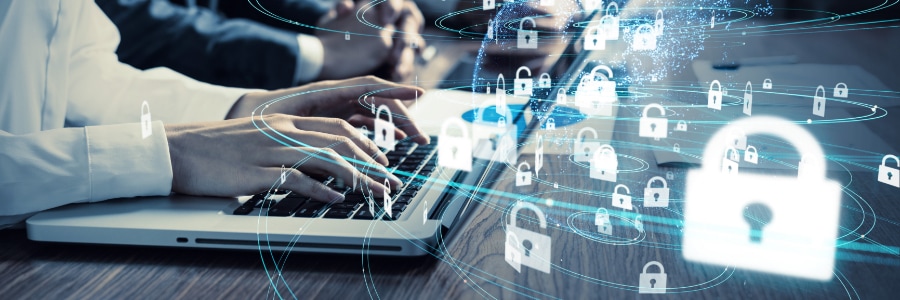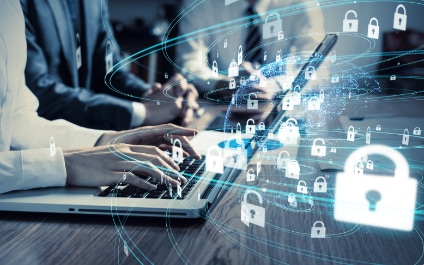
According to the recent "Attack Landscape H1 2019" report, issued by F-Secure, cyberattacks on the internet of things have accelerated to over 2.9 billion events - or, over 300 percent from the previous year. The research also found that this is partially due to the lack of security around ageing devices. In the digital age, endpoint security is more critical than ever. So, what does it do?
Endpoint security is the process of safeguarding the various endpoints on a network. Such parameters are popularly defined to include end-user devices such as mobile devices and PCs. Also, hardware such as data center servers is considered endpoints. The essence of the security system is usually to help address the probable risks that may come with connecting these devices to an enterprise or corporate network.
Endpoint security products will vary, and often include these types of features:
- Insider threat protection
- Data loss prevention
- Disk and email encryption
- Data classification
- Host-based firewalls
- Endpoint detection and response
- Privileged user control
- Dark Web Scans
- Network access control etc.
Why Endpoint Security is Essential
Devices such as smartphones, tablets, or PCs, are all potential entry points for threats. Endpoint security solutions are thus aimed at adequately securing all endpoints connecting to a network. As a result, this is a system that is designed to block illegitimate access attempts and other risky activities at these points of entry.
The need for effective endpoint protection measures has gone up substantially, in light of the rapid rise of cyber-attacks. Employees often rely on mobile devices and PCs to connect to company networks and conduct business. This makes centralized, system-wide security solutions - like Endpoint Security - a must-have in today's ever-shifting and undefinable security terrain.
Endpoint Security vs. Anti-Virus Software: What’s the Difference?
Anti-virus systems are designed around using signature-based updates and virus definition lists. Meaning if the virus exists on the list it will block or attempt to defend against that threat. If the virus/threat does not exist on the list then the anti-virus product will allow the threat to execute.
Endpoint does not rely or signature updates or virus definition lists. It has artificial intelligence that can detect a threat before it becomes known as an actual cyber security threat. It is able to read through code and processes to distinguish if something is going awry. Once this is identified the program will immediately stop and kill the process from executing.
Endpoint also has built in forensics blocking and rollback capabilities. It’s the most advanced product out there in the market. However beware not all endpoint security products are the same. Be careful if the word endpoint is being used because anti-virus vendors are changing the name from anti-virus to endpoint but not providing you the true benefits of an endpoint security product.
The All-important Dark Web Scan Functionality
Despite the vastness of the Internet, there are still many “underground” or hidden websites coined as the Dark Web. You can think of this as similar to going into a hidden alley that can’t be seen without knowing the exact address. Usually, people access the dark web via a special browser and VPN. These are the websites that don't appear on Google or alternative search engines and are inaccessible unless you put specific tools to use.
Aside from a few legitimate purposes, the dark web is also utilized for criminal activities. Criminals who sell databases of stolen credit cards, social security numbers, email addresses online, and electronic health records use these websites to hide and mask their location from law enforcement.
Endpoint Security solutions may have features that will periodically help with scouring data dumps made public on the dark web.
These “data dumps,” include large databases of usernames and passwords—as well as other personal identifiers. This scanning functionality can send alerts if your personal information - or those of an employee - have been found on the dark web.
Why a Dark Web Scan is Vital
You might be wondering whether you need a dark web scan functionality in conjunction with your organization’s endpoint security solution. The answer comes down to one simple word: Yes.
Massive data breaches are occurring at unprecedented rates. Statistically speaking, most Americans have probably had their confidential information leaked in at least one of the many data breaches that have already taken place up to this point. There isn’t a large, global company whose data has not been breached. To put it another way, the genie is out of the bottle. So, a dark web scan is vital to finding out whether your personal credentials are for sale on the dark web.
Final Thought
In order for any organization to survive in this age they must embrace digital transformation. At the same time, it is imperative to remain vigilant to the pervasive cyber threats that have become so common in our digitized world.
With Windows 7 coming to its end of life date THIS JANUARY 2020 it is easier than ever to be breached and have your business brought to a halting stop. Contact us today to inquire about our very affordable state of the art cyber security package. Call us at 201 402 1900 or email us at sales@krsit.com DON'T WAIT TILL YOU ARE HACKED!!

